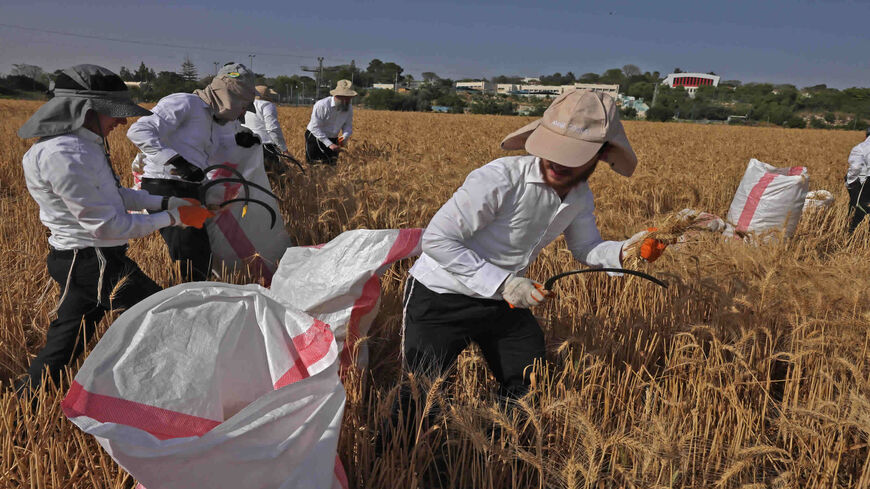BS”D
Shkolim 3a (2)
Kislev 8, 5784. November 21, 2023
1- Our משנה and ברייתא continue on the topic of the announcement and implementation concerning the laws of כלאים.
בראשונה היו עוקרין הכלאים ומשליכין לפני בהמתן.
משרבו עוברי עבירה שלא היו נמנעין לזרוע כלאים והיו שמחין שתי שמחות אחת שמנכשין שדותיהן ועוד שמשליכין לפני בהמתן.
התקינו שיהיו משליכין בדרכים ולא לפני בהמות.
ועדיין היו שמחין שמחה אחת שמנכשין שדותיהן, התקינו שיהיו מפקירין את כל השדה, והפקר ב״ד הפקר כדכתיב וכל אשר לא יבא לשלשת הימים יחרם כל רכושו:

On the 15th of Adar the שלוחי בית דין would go out to the fields and plantation and if they would encounter כלאים, they had the authority to uproot the plants. At a later time in history, בית דין would declare the entire field of the scofflaws as הפקר. (or הבקר as some version of the ירושלמי have it).

2- The גמרא discusses the source of this power that בית דין has, to declare private property as הפקר. Forfeiture by the courts.

3- We discussed the history of the beginning of בית שני and the dilemma of Ezra, realizing that from the rather small amount of people that came to ארץ ישראל from בבל, some were married to non-Jewish wives. This problem was even with the ‘bessere mentchen’…..
Ezra 9-10
Now when these things were done, the princes drew near unto me, saying: ‘The people of Israel, and the priests and the Levites, have not separated themselves from the peoples of the lands, doing according to their abominations, even of the Canaanites, the Hittites, the Perizzites, the Jebusites, the Ammonites, the Moabites, the Egyptians, and the Amorites.
For they have taken their [non Jewish] daughters for themselves and for their sons; so that the holy seed have mingled themselves with the peoples of the lands; and the hand of the princes and rulers had been first in this faithlessness.’
4- So a very distraught Ezra decides to call all of כלל ישראל to a meeting in ירושלים. The purpose was to admonish all those with non Jewish spouse to part from them.
And they made proclamation throughout Judah and Jerusalem unto all the children [that returned from ] the captivity, that they should gather themselves together unto Jerusalem;
And that whosoever came not within three days, according to the counsel of the princes and the elders, all his substance should be forfeited, and himself separated from the congregation of the captivity.
From the above threat of forfeiture, the גמרא derives that בית דין, when necessary, has a right and authority to be מפקיר an individual’s property.

5- The גמרא then continues to question if this power of forfeiture has the ability to effect even at a דאורייתא level.
To be continued.
6- We ended with an interesting observation.
The גמרא says that בית דין followed certain guidelines when deciding if a particular year should be declared a שנה מעוברת and thus will be a 13-month year.
The primary reason for adding a 13th month was to ensure that פסח occurs in the spring time.

However, there were exceptions to this rule.
For example if the year in question, to turn it into a 13 month year or not, was the year of שמיטה, or the year after שמיטה, they would not proclaim it a שנה מעוברת even if that caused פסח to arrive early.
The reason is that the שמיטה prohibition would make food scarce due to the lack of plowing and planting in year 7.

Nearly Empty Grain Silo
Therefore, stretching years 7 or 8 for an extra month would cause hardship.
7- The גמרא then adds another point. All the above guidelines, were only when שנים כתקנן, not when אין השנים כתקנן.
When אין השנים כתקנן, the above rule, of not turning years 7 or 8 into leap years, do not apply.
What do these words mean? ‘Years that are proper’, or years that are ‘they way they are supposed to be’?
Some commentaries say that at a certain time in history the time/season of the wheat harvest was delayed. Meaning that the תבואה, unlike previous years, would not be ready to be harvested until after פסח.
We wondered out loud if this is similar to other facts or laws of nature that have gradually changed since בריאת העולם and consequently (perhaps) have an effect on הלכה.
Here are some links on this interesting topic.
https://www.daat.ac.il/encyclopedia/value.asp?id1=739

7- On this vein we also discussed the מרגלים who brought back an אשכול ענבים, even though their journey occurred in July.
Yet someone remembered that in Israel, the wine grapes were harvested primarily in September…?
Pinto A”H
Zev Sero suggests they brought back eating grapes which become ripe mid summer.
Harvesting Grapes in Summer
He writes:
Wikipedia https://he.wikipedia.org/wiki/%D7%91%D7%A6%D7%99%D7%A8
says that eating grapes are harvested from April through November, while wine grapes are harvested from August through October.

8- In light of the recent turmoil in the Jewish world we viewed the interview of the Rebbe (printed in the NYT 2 days after Gimmel Tamuz by Harvey Swados) where the Rebbe addresses the possibility of another holocaust. ר”ל.
“…מארגען אין דער פרי”
See NYT article here from Chabad.org:
ובא לציון גואל


